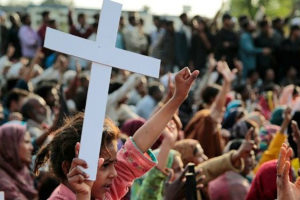Since the beginning of time this world has been dealing with sin and its consequences. Adam and Eve’s fall in the garden leads to many consequences – setting us up for a lifetime of relationship struggles that was not in God’s original plan. As life plays out we watch and see disastrous things start to happen – murder, theft, idolatry, and promiscuity with sexual behavior. God leads His people: in the Exodus movement, and finally with sending Jesus — God in the flesh — to this earth so that we would have power through the Holy Spirit to live a devoted, sinless, Christian life.
Yet, we all know that everyone is fallen, and even with God’s help through the Holy Spirit everyone suffers for the sin that has been introduced to this world long ago. As I shared in my first guest post on The Two Cities, as a medical social work student at the county medical center in the inner-city of Oakland, I feel like my whole day is spent trying to help people clean up after the consequences of their sins, and the sins of others. Some people like to call this “welfare”… I like to call it “love”.
When I first became a Christian at nineteen-years-old I began to read the Gospels and my eyes and heart were opened to the problems of sin and to what God was calling Christians to do — to love. And this love wasn’t going to be an easy love but a sacrificial and dangerous one. In Matthew 4:23-25 we read that Jesus went to the sick and demon-possessed, and continues to do so throughout his ministry. In Matthew 8:23-27 Jesus calms a storm and rescues the lives of his disciples from a natural disaster. In Matthew 14:13-21 Jesus feeds five thousand hungry people. Etcetera, etcetera, it’s pretty clear that most people know that these kinds of acts made up Jesus’ ministry.
To me, it just seems obvious that Jesus’ ministry, and his miracles performed within His ministry, were to “clean up” the consequences of sin in this world – this is how he chose to show His love to humankind. He reached out to people no one else wanted to communicate or have a relationship with, and He told His disciples that they were to “love” these people. And then as a final sacrifice, He gave His life so that people who believed in Him would never taste death. Could it be that Jesus taught us to help people with the consequences of their sin so that we could eventually lead them to a place where they would never have to experience the ultimate consequence of sin?
A friend of mine was telling me about her father who has recently fallen away from Christianity. One of the things he said was that he would become a Christian again when there was no social welfare state in America. He just couldn’t stand the hypocrisy of the American church anymore as people who preach this “social gospel” but never live it out. Many of my classmates and professors at UC Berkeley feel the same way – they like to call me Mother Theresa and are often shocked at my willingness to serve low-income populations. Even in my second day of classes at one of the most “liberal” schools in America, my Jewish professor said that Jesus was the first example of a social worker we have in literature. This blew my mind.
So to be honest, I would love to have this “social gospel” and “social justice” conversation through The Two Cities blog because it is so relevant in churches today. As a starting point, I think it would be helpful to have readers write some feedback about how this post made them feel and what it made you think. Share your struggles with this topic as I would love to walk alongside and learn with you all.
Carrie Allen is currently a student at the University of California at Berkeley where she is studying for a Masters in Social Welfare. Before coming to the Bay Area she was born and raised in Los Angeles, California where she studied Theology at Biola University and Fuller Theological Seminary. Carrie is currently interning in the inner-city of Oakland working as a medical social worker. Some of her interests are public health and the prevention of disease in inner-cities, and how the Christian church should be responding to social justice issues. Carrie likes to spend her free time reading, watching PBS, leading Bible studies for Campus Crusade for Christ at Cal, and hassling the Two Cities bloggers about letting a female writer join the club. Carrie can be reached at carrieallen@berkeley.edu.





11 Comments
Leave your reply.